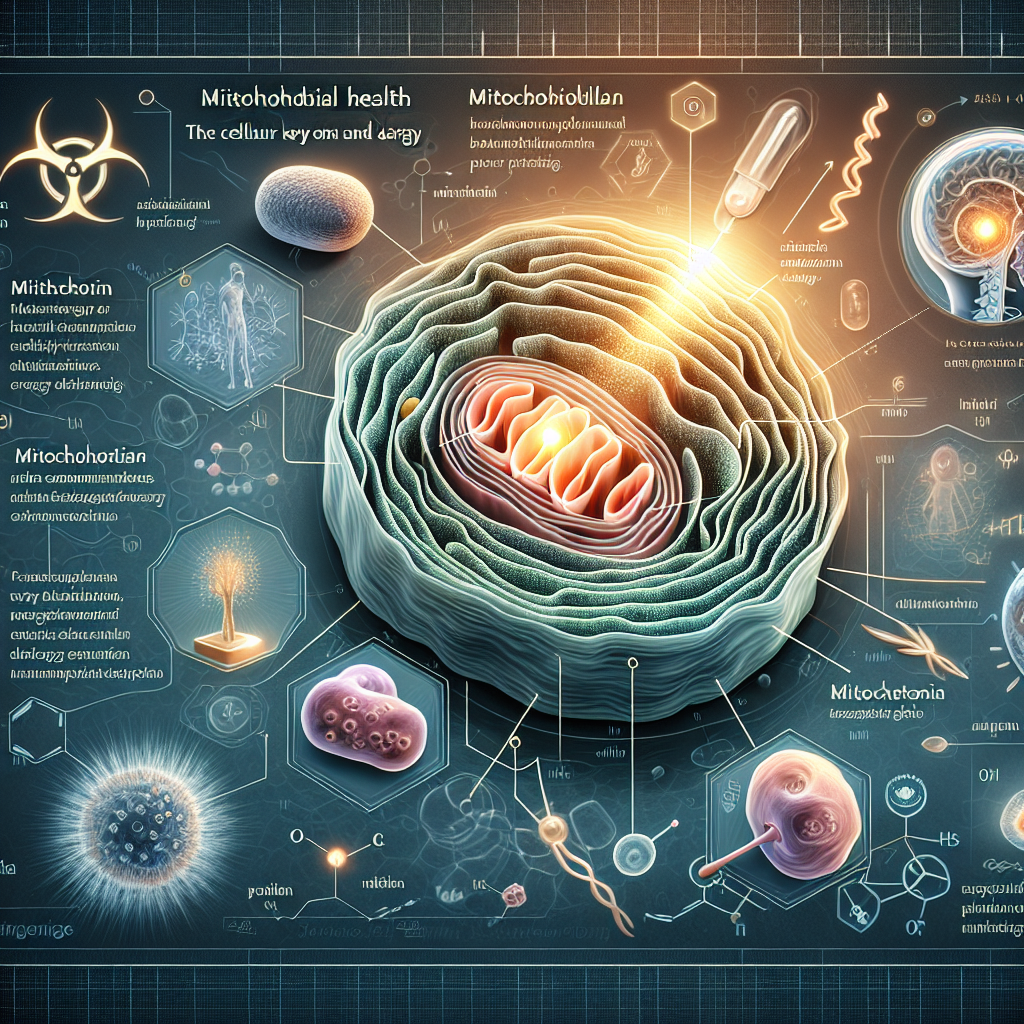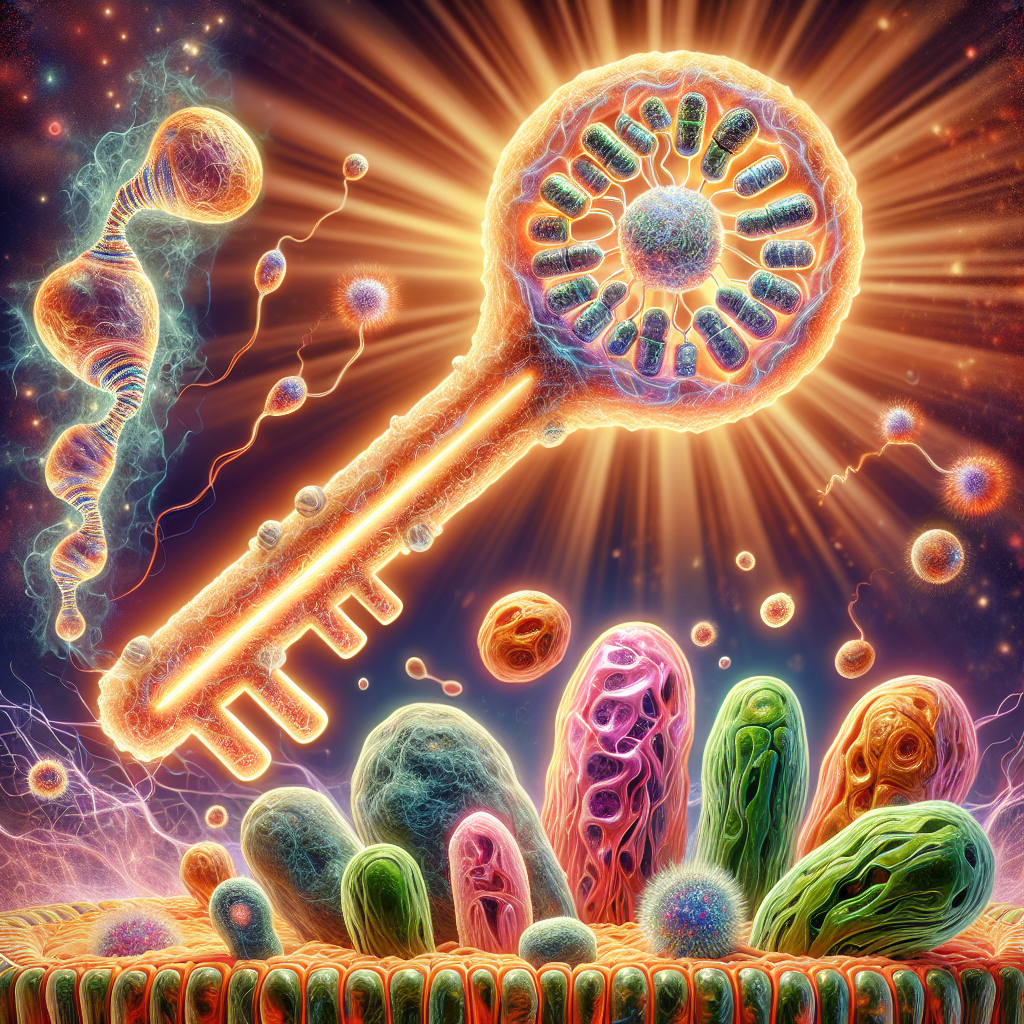Mitochondrial Health: The Cellular Key to Energy and Aging

Discover more about Mitochondrial Health: The Cellular Key to Energy and Aging. Unlock the secrets to a healthier, more energetic, and longer life. Visit My Vibrant Vitality now.
Unlocking the Secrets of Mitochondrial Health for Enhanced Energy and Longevity
Mitochondrial health is a topic that has been gaining significant attention in the scientific community, and for good reason. These tiny powerhouses within our cells play a crucial role in energy production and aging. Understanding the secrets of mitochondrial health could unlock the potential for enhanced energy and longevity.
Mitochondria are often referred to as the “powerhouses” of the cell. They are responsible for producing adenosine triphosphate (ATP), the primary energy currency of the cell. This energy is essential for the functioning of all our bodily systems, from the beating of our hearts to the firing of our neurons. However, the role of mitochondria extends beyond mere energy production. They are also involved in a variety of other processes, including cell signaling, cell differentiation, and cell death.
As we age, our mitochondrial function tends to decline. This decline is associated with a host of age-related diseases, including heart disease, Alzheimer’s disease, and cancer. Moreover, it is also linked to the general symptoms of aging, such as fatigue and reduced cognitive function. Therefore, maintaining mitochondrial health is of utmost importance for healthy aging and longevity.
So, how can we support our mitochondrial health? One of the key strategies is through diet. Certain nutrients are known to support mitochondrial function. These include Coenzyme Q10, a powerful antioxidant that is essential for the production of ATP; B vitamins, which play a crucial role in energy metabolism; and alpha-lipoic acid, which helps to protect mitochondria from oxidative stress. Consuming a diet rich in these nutrients can help to support mitochondrial health and energy production.
Exercise is another important factor. Regular physical activity has been shown to increase the number and efficiency of mitochondria in our cells. This not only boosts energy levels but also helps to slow down the aging process. High-intensity interval training (HIIT) is particularly beneficial, as it has been shown to stimulate mitochondrial biogenesis, the process by which new mitochondria are formed.
In addition to diet and exercise, certain lifestyle factors can also impact mitochondrial health. Chronic stress, for example, can damage mitochondria and impair their function. Therefore, managing stress through practices such as meditation and yoga can be beneficial. Similarly, adequate sleep is essential for mitochondrial health, as it is during sleep that our cells carry out essential repair and maintenance processes.
Emerging research also suggests that certain supplements may support mitochondrial health. For example, PQQ (Pyrroloquinoline quinone) has been shown to stimulate mitochondrial biogenesis, while resveratrol, a compound found in red wine, has been linked to improved mitochondrial function.
In conclusion, mitochondrial health is a key factor in energy production and aging. By adopting a healthy diet, engaging in regular exercise, managing stress, ensuring adequate sleep, and considering the use of certain supplements, we can support our mitochondrial health and potentially enhance our energy levels and longevity. As research in this area continues to evolve, we can look forward to unlocking further secrets of mitochondrial health and its impact on our overall well-being.
Mitochondrial Health: The Unseen Powerhouse of Cellular Energy and Aging

Mitochondrial health is a topic that has been gaining increasing attention in the scientific community. These tiny, yet powerful structures within our cells play a crucial role in energy production and aging. They are often referred to as the powerhouses of the cell, and for good reason. Mitochondria are responsible for producing about 90% of the energy our bodies need to function. They convert the food we eat and the oxygen we breathe into energy that our cells can use, a process known as cellular respiration.
However, the role of mitochondria extends beyond energy production. They are also involved in a variety of other cellular processes, including cell growth, cell death, and the regulation of the cell cycle and cell growth. Moreover, they play a significant role in the aging process. As we age, our mitochondrial function declines, which can lead to a decrease in energy production and an increase in oxidative stress. This, in turn, can contribute to the development of a variety of age-related diseases, including heart disease, Alzheimer’s disease, and Parkinson’s disease.
The health of our mitochondria, therefore, is of utmost importance. But how can we ensure that our mitochondria are functioning at their best? One way is through diet. Certain nutrients, such as Coenzyme Q10, L-carnitine, and alpha-lipoic acid, have been shown to support mitochondrial health. These nutrients help to enhance energy production, protect against oxidative stress, and promote the repair and regeneration of mitochondria.
Exercise is another key factor in maintaining mitochondrial health. Regular physical activity has been shown to increase the number and efficiency of mitochondria, thereby boosting energy production and reducing oxidative stress. In particular, high-intensity interval training (HIIT) appears to be especially beneficial for mitochondrial health.
In addition to diet and exercise, certain lifestyle factors can also impact mitochondrial health. For instance, chronic stress and lack of sleep can impair mitochondrial function, while practices such as mindfulness and meditation can enhance it. Furthermore, exposure to environmental toxins can damage mitochondria, so it’s important to minimize exposure to these harmful substances whenever possible.
Recent research has also highlighted the potential of certain therapeutic strategies to improve mitochondrial health. For example, mitochondrial-targeted antioxidants are a new class of drugs that are designed to selectively accumulate in mitochondria and protect them from oxidative damage. Similarly, therapies that enhance mitochondrial biogenesis, the process by which new mitochondria are formed, are also being explored.
In conclusion, mitochondrial health is a critical factor in energy production and aging. By adopting a healthy diet, engaging in regular physical activity, managing stress, and minimizing exposure to environmental toxins, we can support our mitochondrial health and potentially slow down the aging process. Furthermore, the development of new therapeutic strategies offers promising avenues for enhancing mitochondrial health and combating age-related diseases. As our understanding of mitochondria continues to grow, so too does the potential for harnessing their power for health and longevity.
Revitalizing Your Life: The Role of Mitochondrial Health in Energy Production and Aging
Mitochondrial health is a topic that has been gaining significant attention in the scientific community, and for good reason. These tiny powerhouses within our cells play a crucial role in energy production and aging, making them a key factor in our overall health and vitality. Understanding the role of mitochondria in our bodies can provide us with valuable insights into how we can revitalize our lives and age gracefully.
Mitochondria are often referred to as the powerhouses of the cell. They are responsible for producing adenosine triphosphate (ATP), the primary source of energy that fuels our body’s cells. This energy is essential for carrying out various cellular functions, including growth, repair, and maintenance. Therefore, the health of our mitochondria directly impacts our energy levels and overall vitality.
However, the role of mitochondria extends beyond energy production. They also play a pivotal role in the aging process. As we age, our mitochondrial function tends to decline, leading to a decrease in energy production and an increase in oxidative stress. Oxidative stress is a condition characterized by an imbalance between the production of free radicals, which are harmful molecules, and the body’s ability to counteract their harmful effects. This imbalance can lead to cellular damage and has been linked to various age-related diseases, including heart disease, Alzheimer’s, and cancer.
The good news is that we can take steps to support our mitochondrial health and potentially slow down the aging process. One of the most effective ways to do this is through regular physical exercise. Exercise has been shown to stimulate the production of new mitochondria, a process known as mitochondrial biogenesis. This not only increases energy production but also enhances the body’s ability to combat oxidative stress.
In addition to exercise, a healthy diet rich in antioxidants can also support mitochondrial health. Antioxidants are compounds that help neutralize free radicals, thereby reducing oxidative stress. Foods high in antioxidants include fruits, vegetables, nuts, and whole grains. Moreover, certain nutrients, such as Coenzyme Q10, alpha-lipoic acid, and magnesium, are known to support mitochondrial function and can be obtained through diet or supplementation.
Furthermore, maintaining a healthy lifestyle that includes adequate sleep and stress management can also contribute to mitochondrial health. Chronic sleep deprivation and high stress levels have been linked to mitochondrial dysfunction, underscoring the importance of these lifestyle factors in maintaining our cellular health.
In conclusion, mitochondrial health is a key factor in energy production and aging. By understanding the role of mitochondria in our bodies, we can take proactive steps to support their function and potentially slow down the aging process. Regular physical exercise, a diet rich in antioxidants, and a healthy lifestyle are all crucial for maintaining our mitochondrial health and revitalizing our lives. As we continue to unravel the mysteries of these cellular powerhouses, we may discover even more ways to harness their power for our health and longevity.